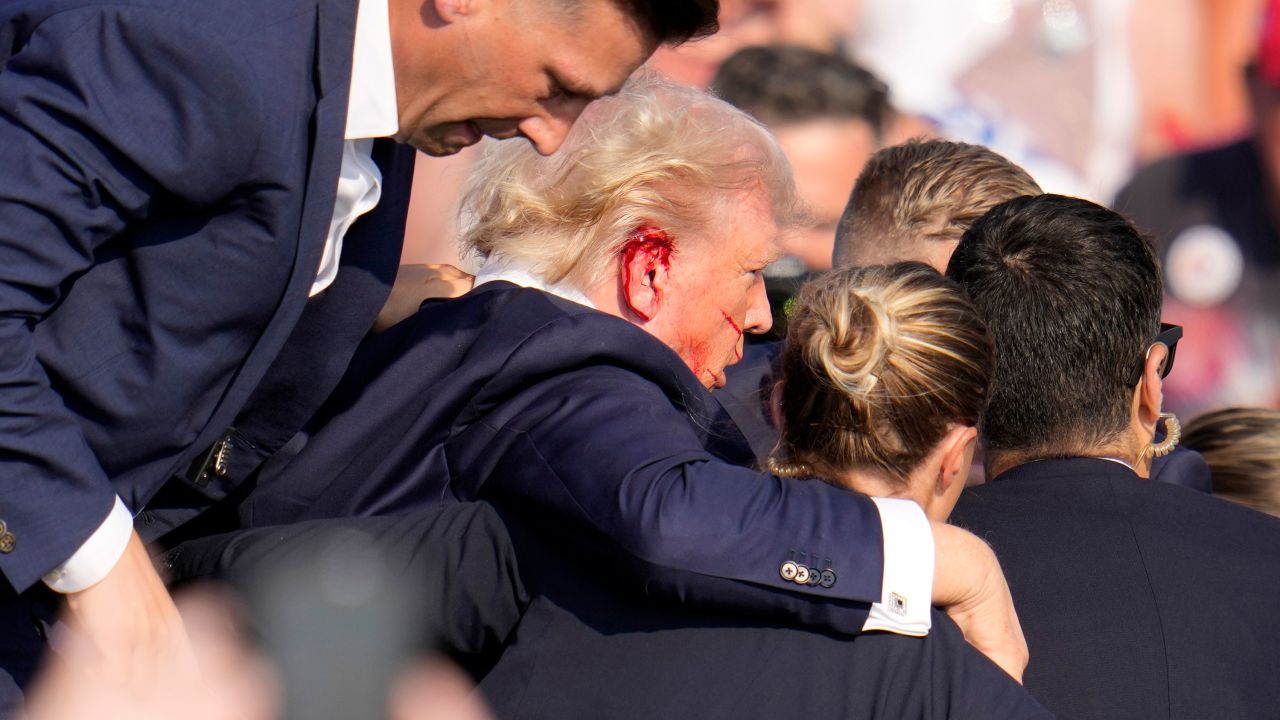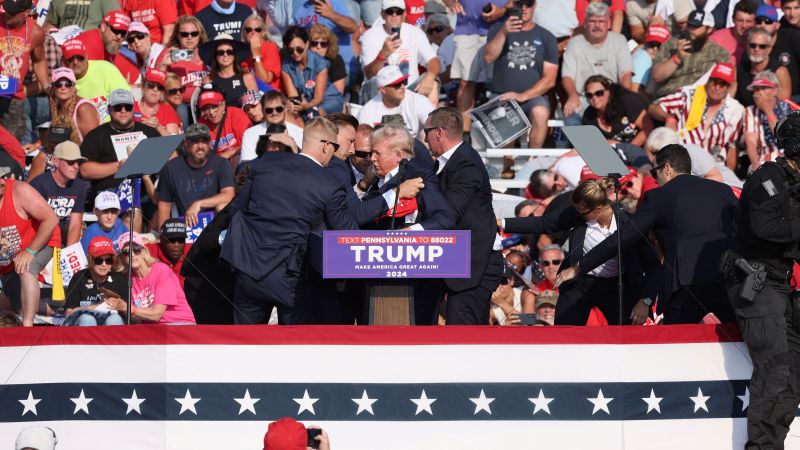The attempted assassination of Donald Trump, which opens a dark new chapter in America’s cursed story of political violence, shook a nation already deeply estranged during one of the most tense periods of its modern history.
The targeting of a former president at a campaign rally just days before he accepts the Republican nomination is, by definition, an attack on democracy and the right of each American to choose their leaders.
The presumptive GOP nominee was on stage, with supporters as usual behind him in bleachers holding up posters and wearing their MAGA regalia, when shots rang out. He flinched, then grabbed the side of his face and disappeared behind his podium as people started to scream and the surreal nature of what was happening began to dawn.
The ex-president later said that he felt a bullet rip through the skin of his ear, which poured with blood as he was rushed from the scene. The shots fired by a gunman on a roof outside the perimeter of his rally at Butler, Pennsylvania, came a fraction of an inch from being a lot worse.
A photograph by Evan Vucci of the Associated Press of a defiant but alive Trump – with blood on his ear and cheek, being rushed off stage by Secret Service agents, fist raised with an American flag in the background – became instantly iconic. The image will define a fraught political age, whatever the so-far unknowable political aftermath of a sunny afternoon that turned into a nightmare.
The pop, pop, pop of gunfire and the sight of a political leader tumbling to the ground – with Secret Service agents rushing to throw themselves on top of him to shield him – awoke grave historic traumas.
While Trump is not currently serving as president, his wounding underscores the ever-present threat that always hangs over the office and those who run for it – and especially for those who claim it. President Joe Biden is the 46th president – and four of his predecessors have been killed while in office, most recently John F. Kennedy in 1963. The fact that Trump was attacked ends a 40-year-period in which many have assumed that the Secret Service’s expertise had greatly reduced the potential for such outrages – and will cast a pall that will last for years.
Trump’s targeting during a presidential campaign drew comparisons to the assassination of Democratic candidate Robert F. Kennedy in 1968, a blood-soaked year that also saw the killing of civil rights leader Martin Luther King Jr. and violence at the Democratic National Convention in Chicago, which will host the same event this year.
But political violence hasn’t stopped since then. In 2011, then-Rep. Gabrielle Giffords, an Arizona Democrat, was left with brain damage after she was shot in the head at an event in which six people were killed. In 2017, a gunman opened fire at a Republican congressional baseball practice, shooting then-House Majority Whip Steve Scalise and three others. The nation is also still processing the attack on the US Capitol by Trump supporters on January 6, 2021.
One Trump supporter at the rally, Joseph Meyn, saw the former president go down and noticed the man who was killed being hit out of the corner of his eye. With eloquence that was remarkable given the shock of what he saw, he told CNN’s Alayna Treene that the attack was a symptom of a country that was consumed by political fury.
“Everyone seems very angry. It just seems like there just a lot of angry people out there. I am not shocked that this happened. I am shocked that I was sitting there and it happened next to me,” he said. “It is just horrible. We should not be at a level of political discourse in this country where this is going to happen.”
“JFK, RFK, MLK … you (had) an attempt (on) the life of Reagan and now you have an attempted assassination of Trump. It is ridiculous. Politics should not be a zero-sum game where someone wins everything and loses everything.”
Saturday’s shocking developments added another volatile political element to a wild and unpredictable election year that has recently seen Biden – the oldest president in history – fighting to save his nomination after a disastrous debate performance and the conviction of Trump, 78, by a New York jury and his vows to wage a second term of “retribution” if he’s reelected.
The only appropriate initial reaction to the horror was relief that a contender for the presidency is still alive and mourning for the Trump supporter who was killed while exercising their democratic freedoms at the rally.
Most leaders and political actors from both sides of the aisle quickly sent prayers to Trump and called for calm.
Biden, who has spent days trying to shore up his campaign, swung into his role as the nation’s chief executive after learning of the shooting while he was at mass in Rehoboth Beach, Delaware. He released a paper statement and then spoke to the nation on camera.
“There is no place in America for this kind of violence – it’s sick, it’s sick, it’s one of the reasons why we have to unite this country. We cannot allow for this to be happening. We cannot be like this. We cannot condone this,” Biden said.
He also said that he’d tried to reach “Donald” by phone and said that the ex-president had been at rally that “should have been able to be conducted peacefully without any problem.” The president, who later was able to connect with his predecessor, ended his weekend at his beach house early and returned to Washington.
Given the viciously polarized state of politics in the United States, the initial shock of the assassination attempt will inevitably cause serious political ramifications.
Trump was already viewed as an unvanquishable hero by his supporters and treated with almost supernatural reverence at his rallies. His image as a fighter who is constantly under attack from his enemies will now be entrenched even more deeply. In a moment of self-possession after he was hit, the former president made sure to create an iconic moment of defiance – raising his fist and shouting “fight, fight” to his crowd – looking directly at the bank of television cameras on a riser.

Video captures shooting at Trump rally
The images will stand in history and enrich Trump’s mythology just as surely as the picture of his mug shot in at Atlanta jail and the footage of his return to the White House in 2020 after beating a serious Covid-19 infection.
There could also be unpredictable implications for an election campaign in which Trump was leading Biden – even before the president’s campaign went into free fall with his disastrous debate performance. And the atmosphere around the Republican National Convention in Milwaukee this week will be even more intense.
Already on Saturday, there were calls for investigations of how a gunman – outside the security perimeter of the rally – was able to get Trump in his sights in a massive failure of security that will rumble on for months and will have implications for all future presidential and campaign events.
Many politicians on both sides of the aisle are already bemoaning the heat of political rhetoric – after yet another chilling indication of what it can produce in a nation in which guns are so easily accessed. It remains to be seen if the shock of Saturday’s events, which could have been a lot worse, will do anything to tame a toxic political culture in which Trump is an enthusiastic participant.
In one of the most poignant reactions, Giffords said in a statement, “Political violence is terrifying. I know.” She added: “I’m holding former President Trump, and all those affected by today’s indefensible act of violence in my heart. Political violence is un-American and is never acceptable – never.”
Unfortunately, history suggests that violence, while indefensible, is also a quintessential scar on American politics.
Read the full article here
